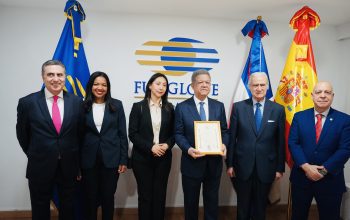news
“Social Networks and their Impact on Education”: GFDD Workshop at the Salomé Ureña Educational Center
July 26, 2016
The Global Foundation for Democracy and Development (GFDD) and the Fundación Global Democracia y Desarrollo (Funglode) organized a workshop as part of New York City’s Salomé Ureña Education Center. The workshop, “Social Networks and their Impact on Education,” was given on July 25 by Paul Goris, Director of Education and Educational Technologies of Funglode.
The workshop on different aspects of social networks was given to a
group of people with limited familiarity on the topic and included the reasonable and appropriate use of social networks; risks of misuse and overuse; educational use of social media in schools and homes and in the area of functional illiteracy, among other things.
Lidia Aguasanta, Parent Coordinator at the Salomé Ureña de Henríquez Campus of The Children’s Aid Society’s, welcomed participants and thanked GFDD/Funglode for supporting projects such as
the camp, which seeks to raise the cultural level of parents at the school, most of whom are Dominican. Ms. Aguasanta stressed the need to continue training parents and noted that some of them came from as far as the Bronx or Yonkers.
Paul Goris presented the topic “Social Networks and their Impact on Education,” in which he addressed social networks as a “non-tech” issue. They analyzed studies dating back to the 18th century and observed how technology has
enabled the emergence of digital social networks such as Web 2.0.
“We looked in detail at the major social networks in use since 2004 up to the present and we stressed the need to learn more about technology. We explained how technology is not evil, as some parents have insinuated, but rather that the inappropriate use of it is what has created the distortions we see today among young people who are becoming disconnected from the real
world.”
Participants learned about Facebook and its benefits, (out of the 17 people who attended the workshop, only 5 are on Facebook).
The workshop continued with a presentation of a video about the reasonable and appropriate use of social media and networks as well as the risks involved, if we are not cautious.
Later, they showed a video on “how to deal with gossip,” especially since many attendees
commented that social networks were only good for spreading gossip.
“We have seen that social networks enable us to educate both in schools and at home and we stressed how important it is that parents get involved in the issues our children are passionate about in order to help them adopt reasonable positions on these issues,” said Mr. Goris.
About the school
In 1992, The Children’s Aid Society
joined in an unprecedented partnership with the New York City Board of Education, Community School District Six and other community-based partners to open the Salomé Ureña Middle Academies (SUMA IS 218) as a full-service community school.
In 2004 it was divided into 3 schools; Children””s Aid still provides full services and programs to all of them. These include: After School, Saturday, Holiday and Summer Programs; Medical, Dental (including orthodontics), Mental
Health and Preventive Services; Emergency Relief through the New York Times Neediest Fund; Parent, Family and Community Engagement and Development opportunities (such as Family Resource Room, Vocational and Educational trainings, Adult Education, Advocacy and Leadership opportunities).
From its inception the school has served as a prototype for hundreds of community schools in the United States and abroad. The school is named after Salomé Ureña de Henríquez
(1850-1897), a revered Dominican poet, feminist and educator –founder of the first school for girls in the Dominican Republic in 1881.







